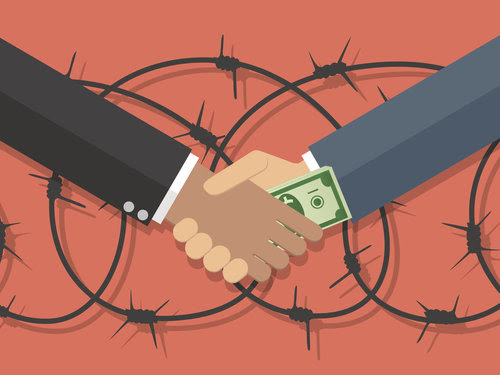Jump To Section: Lede | What We're Reading | Candy | Classics | Sign Up

LEDE
Last year, our Australian colleague Nick McKenzie received a mysterious letter. It read, he wrote later, "like a page from a Le Carre spy thriller":
McKenzie and Baker placed the advertisement in Le Figaro in the last week of July, 2015:
They got their wish. Two weeks ago, Fairfax Media and HuffPost published a series of articles showing that over the course of a decade, hundreds of major international corporations -- including Halliburton/KBR, Rolls Royce, and Samsung -- counted on Unaoil to secure lucrative contracts in Iraq, Kazakhstan, Libya, Tunisia, and more than a dozen other countries. It's common for large multinational corporations to partner with smaller firms with local expertise to win contracts. But the documents reveal that in many cases, Unaoil wasn't winning contracts because of its expertise -- it was winning them by bribing corrupt officials.
(Unaoil threatened to ask Australian courts to block publication, but Fairfax and HuffPost published anyway.)
Now, two weeks later, we're still investigating and digging through the vast trove of documents we obtained. But last week, at the urging of Britain's Serious Fraud Office, Monaco police raided Unaoil's offices and questioned its directors. Law enforcement agencies in Australia, Iraq, the U.K., and the U.S. are now investigating the company and some of its partners. And some of the companies implicated in our reports are now conducting their own internal investigations.
Missed this story? Want to know what all the fuss is about? We'll have more stories in the weeks ahead. But for now, catch up on what you need to know and why it matters. Don't miss our coverage on the banks that are involved, our investigation of energy services giant KBR, and McKenzie's work on the Iraq connection and the Panama Papers connection. And keep your eyes peeled for any mysterious letters!

LEDE
Last year, our Australian colleague Nick McKenzie received a mysterious letter. It read, he wrote later, "like a page from a Le Carre spy thriller":
If my newspaper and I wanted to expose a corporate bribery scandal involving the biggest names in the oil business, the anonymous sender wrote, I should place an advertisement in the real estate section of French newspaper Le Figaro in July 2015.McKenzie's anonymous penpal said he'd been impressed by a 2013 story in which McKenzie had included a few lines on an obscure Monaco-based firm called Unaoil. In that piece, McKenzie and his colleague Richard Baker had reported on allegations that a leading Australian firm had paid huge bribes to powerful officials in charge of large, taxpayer-funded oil field projects, sometimes using Unaoil as a middleman. Unaoil and the Australian company had denied the charges.
The advertisement must include the code word "Monte Christo."
McKenzie and Baker placed the advertisement in Le Figaro in the last week of July, 2015:
"AUSTRALIE SIDNEY 'MONTECHRISTO' : Propriété de luxe, sur terrain de 1.000 m2, maison 850 m2, 8 chambres."Over the next few months, the letter-writer, whom McKenzie codenamed "Le Figaro," slowly provided snippets of information suggesting companies such as Rolls Royce and Halliburton were connected to a global bribery operation. Eventually, McKenzie and his colleagues at Fairfax Media and The Huffington Post obtained tens of thousands of Unaoil's internal emails between 2002 and 2012, many addressed to its multinational clients. McKenzie's sources "never asked for money," he wrote. "What they wanted was for some of the wealthiest and most powerful figures in governments and companies across the globe to be exposed for acting corruptly, and with impunity, for years."
They got their wish. Two weeks ago, Fairfax Media and HuffPost published a series of articles showing that over the course of a decade, hundreds of major international corporations -- including Halliburton/KBR, Rolls Royce, and Samsung -- counted on Unaoil to secure lucrative contracts in Iraq, Kazakhstan, Libya, Tunisia, and more than a dozen other countries. It's common for large multinational corporations to partner with smaller firms with local expertise to win contracts. But the documents reveal that in many cases, Unaoil wasn't winning contracts because of its expertise -- it was winning them by bribing corrupt officials.
(Unaoil threatened to ask Australian courts to block publication, but Fairfax and HuffPost published anyway.)
Now, two weeks later, we're still investigating and digging through the vast trove of documents we obtained. But last week, at the urging of Britain's Serious Fraud Office, Monaco police raided Unaoil's offices and questioned its directors. Law enforcement agencies in Australia, Iraq, the U.K., and the U.S. are now investigating the company and some of its partners. And some of the companies implicated in our reports are now conducting their own internal investigations.
Missed this story? Want to know what all the fuss is about? We'll have more stories in the weeks ahead. But for now, catch up on what you need to know and why it matters. Don't miss our coverage on the banks that are involved, our investigation of energy services giant KBR, and McKenzie's work on the Iraq connection and the Panama Papers connection. And keep your eyes peeled for any mysterious letters!

No comments:
Post a Comment